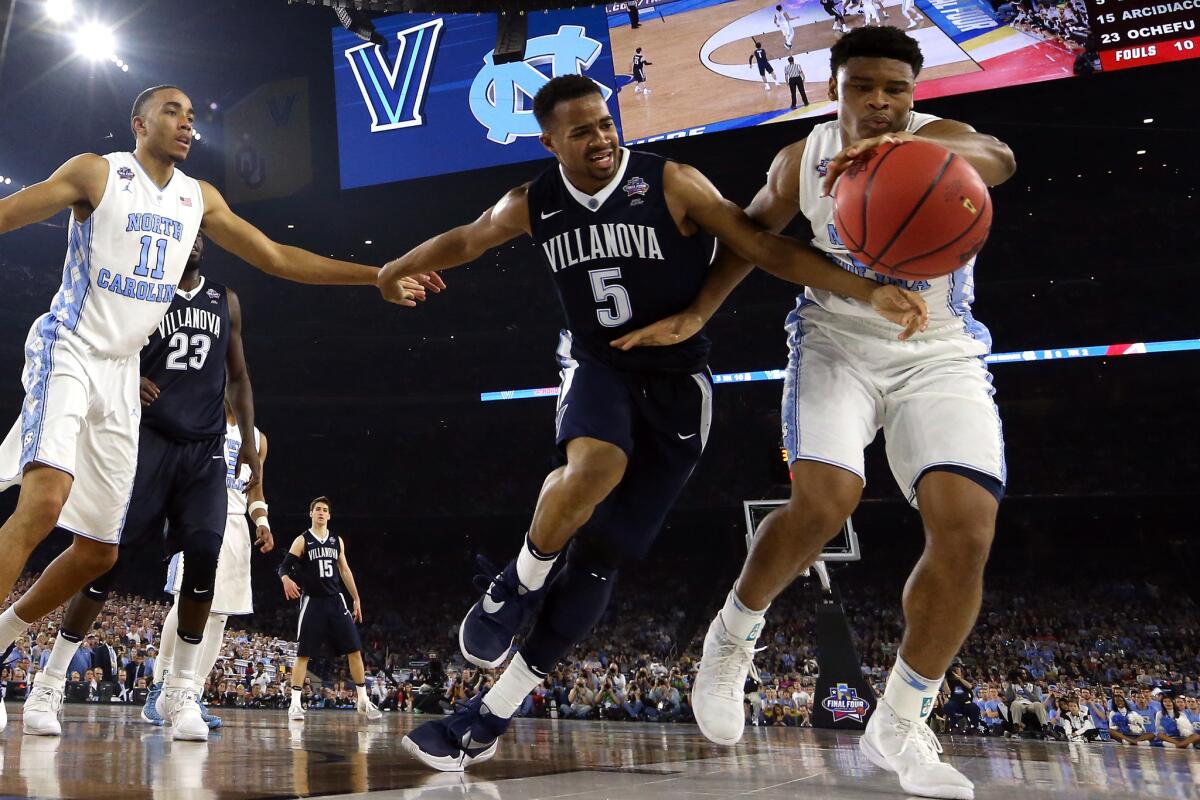March Madness through 2032: CBS and Turner extend contract for NCAA men’s basketball tournament

Phil Booth, center, of Villanova fights Isaiah Hicks, right, of North Carolina for the ball during the 2016 NCAA Men’s Final Four National Championship game on April 4, 2016, in Houston, Texas.
- Share via
CBS and Turner Sports have renewed their vows with the NCAA, keeping the television rights of the Division I Men’s Basketball Championship through 2032 with an extension worth $8.8 billion.
The deal, which will pay the NCAA an average of $1.1 billion a year for eight years starting in 2025, further demonstrates the value of live sports TV events in an age when viewers can watch their favorite programs at their own convenience.
The new deal begins after the conclusion of the current 14-year contract, which pays the NCAA $10.8 billion over its full term.
By extending the rights, CBS and Turner come well-armed the next time they negotiate carriage deals with cable and satellite operators.
Both CBS Sports Chairman Sean McManus and Turner Broadcasting President David Levy acknowledged in a telephone interview that the event gives their companies leverage when those agreements come up over the course of the lengthy deal.
“Increasingly, television is all about big events,” McManus said.
The executives said they were highly motivated to extend the deal, which has been beneficial to both companies since it was signed in 2010.
“The thinking is it’s been a successful three-way partnership for six years so why not continue it,” CBS Chairman Leslie Moonves told the Times.
Turners’ cable networks TNT, TBS and TruTV have seen their ratings skyrocket during the tournament weeks. Fans have been happy with the deal as it makes every game in the tournament available on national television.
CBS structured the deal so that it would be protected from any losses. On its own, CBS had been losing around $100 million on the tournament which had just been supported by ad revenue alone. From 1982 to 2010, the network had been the sole rights-holder for the event.
CBS has been in profit in every year under the current arrangement with Turner, according to McManus. That will continue under the extension, he said.
For Turner, Levy said that the current deal “outperforms all of our expectations, including our financials” and that there will be an opportuntity for “greater upside” in the extension.
The rights to must-have programming is a vital for cable networks as they fight the trend of consumer cord-cutting which reduces their revenue from subscriber fees.
The deal includes digital streaming rights to the games as well.
Lee Berke, president of the TV sports consultancy LHB Sports, Entertainment & Media, believes the deal is a positive one for all of the partners.
“The NCAA gets a very healthy average yearly increase of nearly [43%] while CBS and Turner can jointly exploit across all media platforms one of the most valuable live events in sports,” he said.
Levy said there are no plans to change the arrangement in which the championship final alternates between CBS and Turner. Turner carried the game this year, marking the first time it had not been on broadcast television.
2:37 p.m.: This story was updated with comments from Moonves and Berke.
Follow @SteveBattaglio on Twitter
More to Read
Sign up for The Envelope
Get exclusive awards season news, in-depth interviews and columnist Glenn Whipp’s must-read analysis straight to your inbox.
You may occasionally receive promotional content from the Los Angeles Times.







